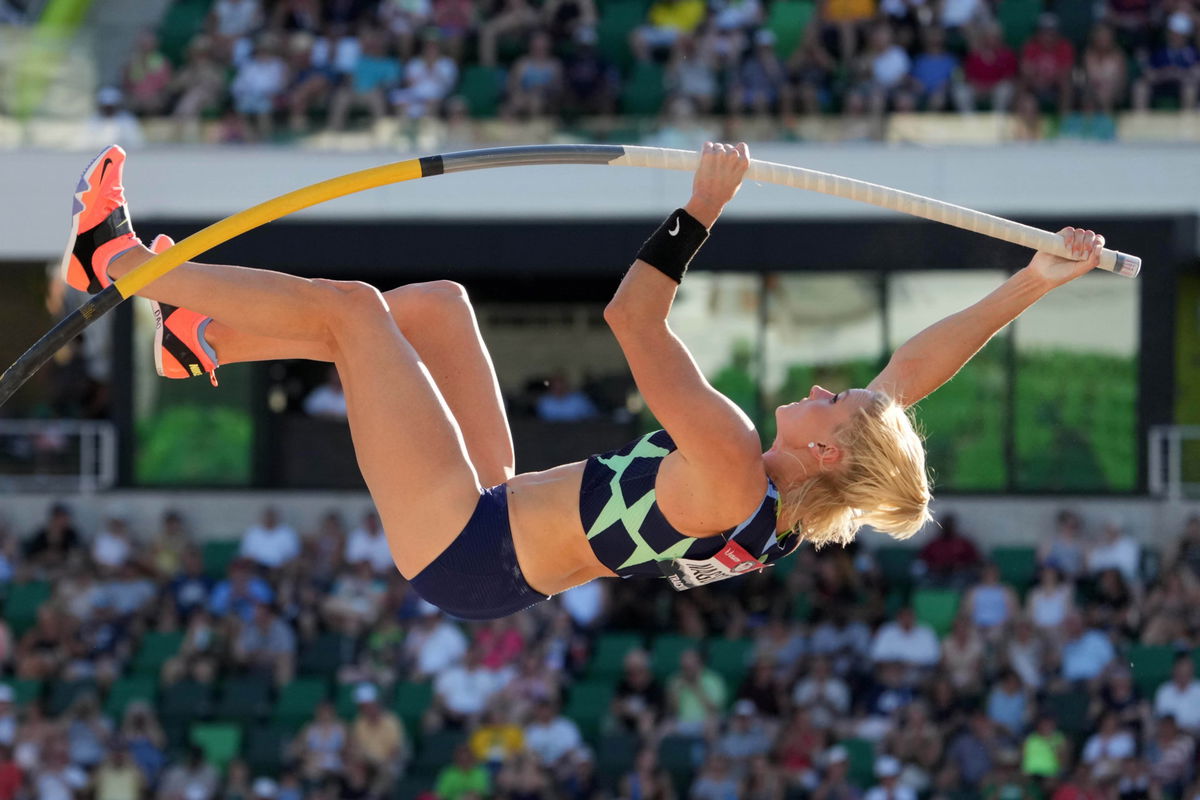

Katie Moon, whose landmark pole vaulting feats have been acknowledged around the globe, unveiled her mental health concerns a few weeks ago to a gathering of people at the Akron Roundtable. Despite having attained remarkable successes, she elucidated her struggles, expressing an appreciation for synchronized care for one’s physical and mental well-being.
Watch What’s Trending Now!
Her impressive narrative of fortitude and determination was a powerful message of pushing through, countering the notion that either mental or physical wellness should be given precedence over the other. In sharing her tribulations, recently, Moon courageously presented an inspiring illustration and reminded her listeners of the common struggles many people experience.
ADVERTISEMENT
Katie Moon’s inspiring journey: From tears to triumph
Katie Moon, formally known as Katie Nageotte, enthralled her audience with an inspiring tale about her unique road to greatness. As she delved into her journey, she remarked, “This year has just been fun. Even on days where I don’t have my best day, I used to leave in tears, and now I am good.” She highlighted the extensive variation of emotions she underwent and how it strengthened her will.
“It really took me fixing my mentality before we could fix the technical aspects.”
Olympic and world pole vault champion @ktnago13 opens up about the anxiety she has had within the sport and the importance of mental health 🧠
She competes at @athletissima 🇨🇭
🎙️ @stuartweir pic.twitter.com/xIh02oz3QT
— AW (@AthleticsWeekly) June 30, 2023
Moon’s story was wrought with difficulty, the most prominent being the unfortunate passing of her father when she was in her teens. Overcoming from profound sorrow, Moon enrolled at Ashland University, seeking a new horizon, while grappling with her trepidation about pole vaulting. Her coach, Brad Walker, changed Moon’s perspective and gave her the courage to excel. Even now, as she stands at the end of the runway, Moon recollects her mentor’s words: “To this day, I still am kind of afraid to pole vault because of that, and [Walker] taught me how to think on the runway.”
ADVERTISEMENT
The importance of seeking help: Shattering the stigma
Moon’s inspiring journey serves as a reminder that even Olympic champions face immense challenges and that perfection is an unattainable standard. Moon asserted, “People see winning the Olympics and assume everything has to be perfect to make that happen and that things have to be perfect to achieve whatever goal they want to achieve. It’s like, no, no. That’s not how life works.”
ADVERTISEMENT
Also Read: Playing Golf in Lockdown Helped Pole Vaulter Armand Duplantis Clinch the Gold at Tokyo Olympics 2020
Top Stories
Cowboys Fire Defensive Coordinator Matt Eberflus: Contract, Salary, NFL Earnings & More

Ross Chastain Labels NASCAR Driver “The Most Punchable Face” to Excuse Himself Over Punchgate Controversy

10 Biggest NFL Draft Busts of the Last Decade, Including Trey Lance and Justin Fields

Andy Reid Sets Record Straight on Travis Kelce’s Chiefs Future As Retirement Question Continue to Mount

Commissioner Steve Phelps Quits NASCAR Days After Getting Exposed in Lawsuit Trial

Ex-Wife Elin Nordegren’s Reaction to Tiger Woods Dating Vanessa Trump Speaks Volumes

After the Tokyo Olympics, Moon was captivated by the dire consequences of post-Olympic gloom. A graduate of Ashland University’s esteemed Psychology program, Moon became a sagacious symbol of hope for those facing their battles in silence.

Reuters
Tokyo 2020 Olympics – Athletics – Women’s Pole Vault – Final – Olympic Stadium, Tokyo, Japan – August 5, 2021. Katie Nageotte of the United States reacts after clearing the crossbar REUTERS/Dylan Martinez TPX IMAGES OF THE DAY
Acknowledging the strength it takes to reach out, she emphasized, “It’s OK to seek help. That’s normal, and it doesn’t make you weak. If anything, I think it shows strength if you can admit, ‘OK, I need to talk to someone.” Notable athletes such as Myles Garrett have also come forward to admit their own struggles. In order for society to triumph in its fight for mental and physical prosperity, individuals like Moon must demonstrate the courage to speak up.
ADVERTISEMENT
Watch This Story: “Terror and the Olympics”: Ukraine President Drops Heartfelt Plea Following IOC’s Russia Decision
ADVERTISEMENT
ADVERTISEMENT
ADVERTISEMENT

